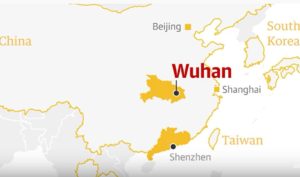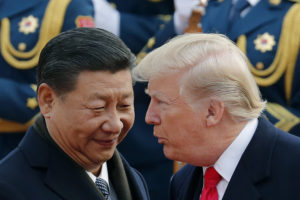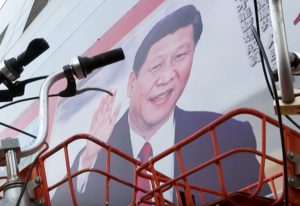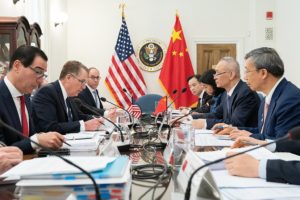Trump Is Trying to Save Jobs—in China
The president says he has ordered the Commerce Department to help get a Chinese telecommunications company "back into business" after the U.S. cut off access to its American suppliers.WASHINGTON—President Donald Trump said Sunday he has instructed his Commerce Department to help get a Chinese telecommunications company “back into business” after the U.S. government cut off access to its American suppliers.
At issue is that department’s move last month to block the ZTE Corp., a major supplier of telecoms networks and smartphones based in southern China, from importing American components for seven years. The U.S. accused ZTE of misleading American regulators after it settled charges of violating sanctions against North Korea and Iran.
ZTE, which has more than 70,000 employees and has supplied networks or equipment to some of the world’s biggest telecommunications companies, said in early May that it had halted its main operations as a result of the department’s “denial order.”
Trump, who has taken a hard line on trade and technology issues with Beijing, tweeted on Sunday that he and Chinese leader Xi Jinping “are working together to give massive Chinese phone company, ZTE, a way to get back into business, fast. Too many jobs in China lost. Commerce Department has been instructed to get it done!”
In a separate tweet, the president said the two economic giants were “working well together on trade, but past negotiations have been so one sided in favor of China, for so many years, that it is hard for them to make a deal that benefits both countries. But be cool, it will all work out!”
ZTE has asked the department to suspend the seven-year ban on doing business with U.S. technology exporters. By cutting off access to U.S. suppliers of essential components such as microchips, the ban threatens ZTE’s existence, the company has said.
The U.S. imposed the penalty after discovering that Shenzhen-based ZTE, which had paid a $1.2 billion fine in the case, had failed to discipline employees involved and paid them bonuses instead.
ZTE’s case dates to before Trump took office in January 2007 but the Commerce Department’s decision came amid worsening trade tensions between the U.S. and China centered on technology-related intellectual property.
Just ahead of trade talks earlier this month, the Trump administration handed China a list of hard-line demands that trade experts said could make it even more difficult to resolve the disputes between the world’s two largest economies.
At the trade meetings in Beijing, Chinese officials said they raised their objections to ZTE’s punishment with the American delegation, which they said agreed to report them to Trump.
“A reversal of the ZTE decision could temporarily tamp down trade tensions by allowing the Chinese to make concessions to the U.S. without losing face,” said Eswar Prasad, a professor of trade policy at Cornell University. “Trump may have recognized that backing off on ZTE clears the path for him to claim at least a partial victory in the US-China trade dispute based on the concessions the Chinese seem prepared to offer.”
Trump is seeking to cut the chronic U.S. trade deficit by $100 billion and gain concessions over the policies that foreign companies say force them to share technology in order to gain market access.
Your support matters…Independent journalism is under threat and overshadowed by heavily funded mainstream media.
You can help level the playing field. Become a member.
Your tax-deductible contribution keeps us digging beneath the headlines to give you thought-provoking, investigative reporting and analysis that unearths what's really happening- without compromise.
Give today to support our courageous, independent journalists.






You need to be a supporter to comment.
There are currently no responses to this article.
Be the first to respond.